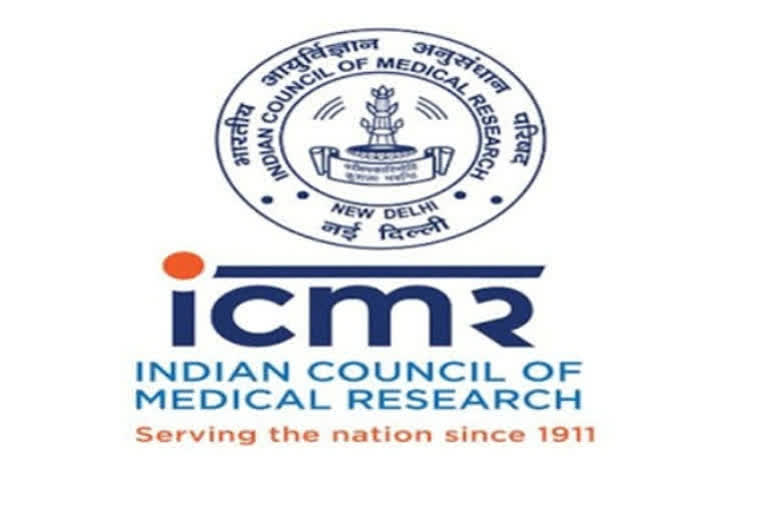New Delhi: As the Covid-19 scenario in India has been witnessing a declining trend, the Indian Council of Medical Research (ICMR) will start its next sero survey this month. The sero survey, fourth by ICMR, will ascertain the sero-prevalence among people of all age groups. "Through the sero survey, we can identify the hotspots. We suggest all the state governments initiate state-specific sero surveys because of geographic identification. We need to identify the hotspots to stop the spread of infection," said Dr VK Paul, Chairman of the National Task Force on Covid-19.
Repeated cross-sectional sero surveys in the same geographic area establish the trend of the evolving pandemic. National serosurvey estimates the seroprevalence of SARS-CoV-2 infection among the general population and health care workers of India. ICMR conducted the third population-based serosurvey between December 18, 2020, and Jan 6, 2021, in the same 700 villages from 70 districts in 21 states across India, which were selected for the first and second serosurveys.
The findings of the third sero survey indicate that about 24 per cent of individuals aged 10 years and above and about 26 per cent of health care workers (HCWs) working in sub-district level public health facilities were exposed to SARS-CoV-2 infection by December 2020. Sero-prevalence of SARS-CoV-2 infection was lower among adults aged 18-44 years and in rural areas.
Also Read: Implement one nation one ration card, SC tells Bengal
"India's Covid positivity rate has come down to almost 5 per cent. The situation is stabilizing, however, we need to adopt extreme precautions and maintain Covid appropriate behaviour," said Dr Paul while addressing a press conference in New Delhi on the latest scenario of India's Covid-19 situation. Referring to the possible third wave, Dr Paul said that our scientists need to look after the various mutants. He further added, "Our scientists also need to continuously study the variants."
Referring to a report submitted by experts from the Indian Public Health Association (IPHA), Indian Association of Preventive and Social Medicine (IAPSM) and Indian Association of Epidemiologists (IAE) to Prime Minister Narendra Modi, Dr Paul said that an expert group is looking into their recommendations. "Their recommendations are welcome. Our expert committee is looking into their recommendation and an appropriate call will be taken after proper examination," said Dr Paul, who is also a member of Niti Aayog.
The public health experts have recently submitted its report to Prime Minister Narendra Modi and suggested vaccinating the vulnerable and those at risk, instead of mass population-wide inoculation including children. Dr Paul further added that the expert committee is also examining the need to decrease the gap between the two doses of Covishield. "Our well-acclaimed experts are examining the matter and they will take a final call, if necessary, looking after Indian context," said Dr Paul.
Referring to the reports of USFDA's denial to give emergency use authorization to Covaxin, Dr Paul said that it will not hamper vaccine's prospects in India. "We don't have any issue with the manufacturers. They are doing well and they may also come with the data of phase 3 clinical trials very soon," said Dr Paul. Referring to the availability of vaccines in India, Dr Paul said that more vaccines will hit the market very soon. "Genova is bringing vaccines on mRNA technology whereas Zydus is bringing vaccines based on DNA technology, there will be more different vaccines in the coming days," Dr Paul added.
Also Read: PIL in SC relating to human trafficking and smuggling
Meanwhile, Lav Agarwal, Joint Secretary in the Health Ministry said that the country has been witnessing a continuous decline in cases since India reported a peak on May 7. "Almost 78 per cent decline in cases since the highest reported peak in daily new cases. The number of Covid cases was 4,14,188 on May 7 and it came down to 91,701 on June 11," said Luv Agarwal.
He said that there is a consistent decline in average daily new cases since the week of 1-7 May. "A decline of 31 per cent in average daily new cases in the last week," he informed. He said that 531 districts were reporting more than 100 daily new cases during the last week of May. Whereas the number of districts with daily 100 new cases has come down to 196 in the current week of June. Referring to the vaccination process, Luv Agarwal said that 24.61 crore doses have been given to people of all age groups to date.
Also Read: SC slams Centre on database for unorganised workers



